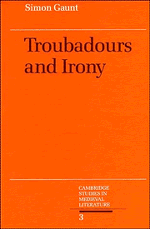Summary
Peire d'Alvernha admired Marcabru and did not mind being seen to imitate him:
Chantador, lo vers vos fenis:
aprendetz la comensansa.
Marcabrus per gran dreitura
trobet d'altretal semblansa.
(xiii, 367–9)Singers, I finish the verse for you: learn the beginning. Marcabru, through great rectitude, composed in a similar way.
There are, however, fundamental differences between Peire's poetry and Marcabru's, differences which affect considerably the use the two poets make of irony.
Marcabru is concerned more with truth and meaning than with eloquence. Unquestionably proud of his own skills, he mistrusts eloquence which can be put to the service of evil and explicitly condemns obscurity. There are, of course, different levels of meaning in Marcabru's poetry, but they are distinct and discernible; his chief concern is to convey a message, and ambivalence, where it exists, is intended to enhance rather than confuse his exposition of the moral issues at stake.
Peire, on the other hand, delights in eloquence for its own sake. In his love lyrics, he extols the quality of his poetry, not, like Bernart de Ventadorn, in order to illustrate how it is inspired only by the quality of his love, but because he wishes to demonstrate his superiority as a poet:
Ab fina ioia comenssa
lo vers qui bels motz assona
e de re noi a faillenssa;
mas no m'es bon qe l'apreigna
tals cui mos chans non coveigna,
q'ieu non vuoill avols chantaire,
cel que tot chan desfaissona,
mon doutz sonet torn'en bram.
(iii, 1–8)- Type
- Chapter
- Information
- Troubadours and Irony , pp. 97 - 120Publisher: Cambridge University PressPrint publication year: 1989



